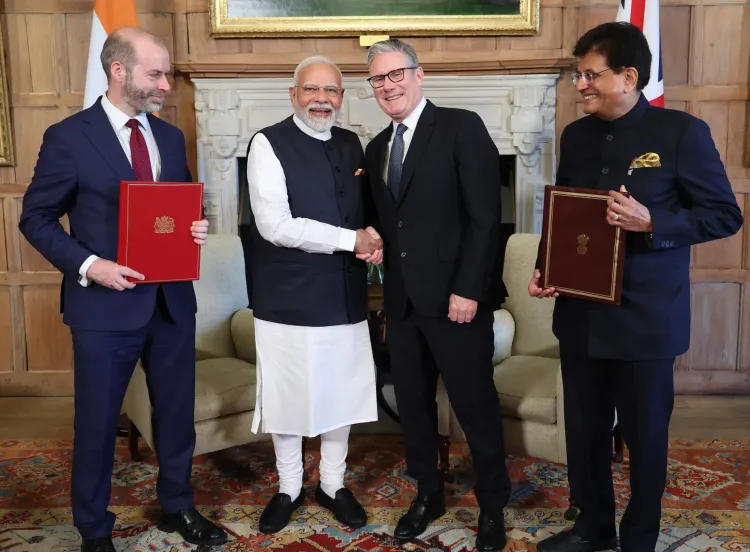What Opportunities Does the DGFT Outreach Programme Highlight for the India–UK Trade Pact?

Synopsis
Key Takeaways
- Strategic Importance: The CETA enhances India's trade footprint in the UK.
- MSME Opportunities: Indian MSMEs can tap into global value chains.
- Sustainability Focus: Aligning with UK standards is vital for premium access.
- Sectoral Insights: Key sectors discussed include agriculture, handicrafts, and luxury goods.
- Supply Chain Transparency: Essential for maintaining trust with UK partners.
New Delhi, Sep 29 (NationPress) The Directorate General of Foreign Trade (DGFT), a body under the Ministry of Commerce and Industry, organized an outreach event focused on the recently finalized India–UK Comprehensive Economic and Trade Agreement (CETA) on Monday.
During the event held at Bharat Mandapam, Ajay Bhadoo, the Director General of Foreign Trade and Additional Secretary in the Ministry of Commerce and Industry, emphasized the strategic importance of CETA in enhancing India’s presence in the UK market.
He mentioned the benefits of tariff reductions, easy access to markets, and the potential for Indian MSMEs to become more integrated into global value chains.
From the UK government’s perspective, Anna Shotbolt, the Deputy Trade Commissioner for South Asia at the British High Commission in India, referred to the agreement as a “significant milestone in bilateral trade relations” and encouraged Indian exporters to meet sustainability and quality benchmarks to seize premium opportunities within the UK market.
The event highlighted sector-specific insights with active engagement from India’s prominent export promotion councils.
Leaders from the manufacturing and creative sectors discussed their industry strengths. Shaunak Parikh, Vice Chairman of the Gem and Jewellery Export Promotion Council (GJEPC), elaborated on positioning Indian gems and jewellery within the luxury retail sector of the UK, while Rajesh Rawat, Additional Executive Director of the Export Promotional Council for Handicrafts (EPCH), pointed out how handicrafts and carpets could claim exclusive segments in the UK’s premium markets.
Abhishek Dev, Chairman of APEDA, noted the rising demand for Indian agricultural and processed food products in the UK, stating that CETA opens doors for India to explore niche markets such as ethnic foods, organic products, and ready-to-eat meals.
Additionally, Ajay Sahai, Director General of FIEO, highlighted the necessity of exploring multi-sector opportunities, urging exporters to transcend traditional markets and utilize digital tools for enhanced reach to UK consumers.
The dialogue was further enriched through insights from buyers, with Anchal Kansal, General Secretary of the Buying Agents Association, emphasizing the need for supply chain transparency and punctual deliveries to maintain trust with UK clients.
The UK India Business Council (UKIBC) and HSBC also provided their perspectives on promoting industry collaborations and establishing resilient supply chains to strengthen India–UK trade.
The event wrapped up with an engaging question and answer (Q&A) session involving exporters.









